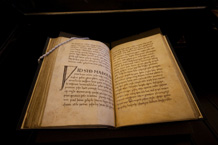This article needs additional citations for verification. (May 2010) |
| Wulf and Eadwacer | |
|---|---|
| "Eadwacer" "Wulf" | |
 Exeter Book (Exeter Cathedral Library MS 3501), the manuscript in which Wulf and Eadwacer is recorded | |
| Author(s) | Unknown |
| Language | West Saxon dialect of Old English |
| Date | c. AD 970–990 (date of manuscript) |
| Manuscript(s) | Exeter Book (Exeter Cathedral Library MS 3501) |
| Genre | Old English elegiac poetry |
| Verse form | Alliterative verse |
| Length | 19 lines |
"Wulf and Eadwacer" ([ˈæ͜ɑːd.wɑtʃ.er], approximately ADD-watcher) is an Old English poem in alliterative verse of famously difficult interpretation. It has been variously characterised, (modernly) as an elegy, (historically) as a riddle, and (in speculation on the poem's pre-history) as a song or ballad with refrain. The poem is narrated in the first person, most likely with a woman's voice. Because the audience is given so little information about her situation, some scholars argue the story was well-known, and that the unnamed speaker corresponds to named figures from other stories, for example, to Signý[1] or that the characters Wulf and Eadwacer correspond to Theoderic the Great and his rival Odoacer.[2][3] The poem's only extant text is found at folios 100v-101r in the tenth-century Exeter Book,[4][5] alongside other texts to which it possesses qualitative similarities.
- ^ Sebo, Erin (1 March 2021). "Identifying the Narrator of Wulf and Eadwacer? Signy, the Heroides and the Adaptation of Classical Models in Old English Literature". Neophilologus. 105 (1): 109–122. doi:10.1007/s11061-020-09653-7. ISSN 1572-8668.
- ^ Shiels, Ian. "Wulf and Eadwacer: why I think I've solved the mystery of this Old English poem". The Conversation. Retrieved 1 March 2023.
- ^ Shiels, Ian (2022). "Wulf and Eadwacer Reloaded: John of Antioch and the Starving Wife of Odoacer". Anglia: Journal of English Philology. 140 (3–4): 373–420. doi:10.1515/ang-2022-0056. S2CID 254294773. Archived from the original on 19 January 2023.
- ^ "The Exeter Book". theexeterbook.exeter.ac.uk. Retrieved 15 March 2022.
- ^ Fry, Donald K. (1971). ""Wulf and Eadwacer": A Wen Charm". The Chaucer Review. 5 (4): 247–263. ISSN 0009-2002. JSTOR 25093167.